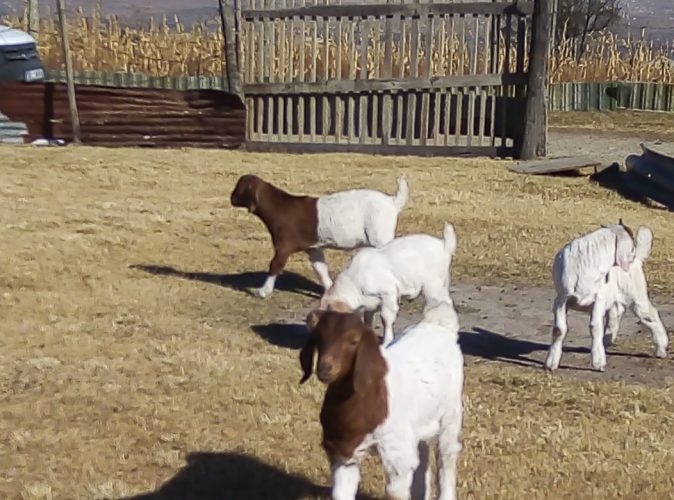Livestock production is one of the most important activities of agriculture in South Africa. The Boer goat is a breed of goat that was developed in South Africa in the early 1900s and is a popular breed for meat production. Their name is derived from the Afrikaans word boer, meaning farmer. They have a high resistance to disease and adapt well to hot, dry semi-deserts. The standard boer goats have white bodies and distinctive brown heads. Mnoneleli Matam is an emerging boer goat farmer. He hails from a village in Mt Frere in the Eastern Cape province of South Africa.
“I took a decision to venture into goat farming because I personally needed just one for a cultural ritual – a ceremony where I was supposed to slaughter a goat but I couldn’t find any. Cultural practices among black communities provide a steady market for live slaughter of boer goats. I started in 2000 with only three indigenous goats. I bought these from a town called Mqanduli where I was working at the time as they were not available in my home town. I took them home to Mt Frere and on arrival, one died then I was left with two. I did not have a buck so I was dependent on my neighbor for mating as he also had goats. These goats got pregnant, one gave birth while the other one had a miscarriage, I was demotivated”.
Through the support of the family, Matam managed to buy five more goats and he felt now that was the real beginning. It was like a miracle happened as all goats fell pregnant and all gave birth to twins. Matam tried to improve his knowledge on breeding boer goats by searching for information on the internet. “I came across one farmer from Uganda, Hamiisi Semanda. His YouTube videos assisted me a lot, I learned a lot from them. I also decided to enroll for a National Diploma in Livestock Production”.

According to Farmers Weekly magazine, the Boer goat is bred to thrive under extensive livestock farming conditions in hot, arid environments where the quality of grazing is poor. The breed has the ability to convert poor-quality forage into meat at a very low cost, enabling livestock farmers in these arid areas to farm commercially.
For any business, there are both opportunities and challenges. Mnoneleli Matam identified the following opportunities:
- The market is readily available as most people use them for traditional or cultural ceremonies
- Getting support from a local veterinarian.
Matam also mentioned the following challenges:
- Theft
- Fodder shortage especially during drought
- Water shortage
- Inadequate management program and
- Diseases mainly caused by ticks, that is, internal and external parasites management
He currently has a flock of 110 boer goats and is happy with the progress he has made.

